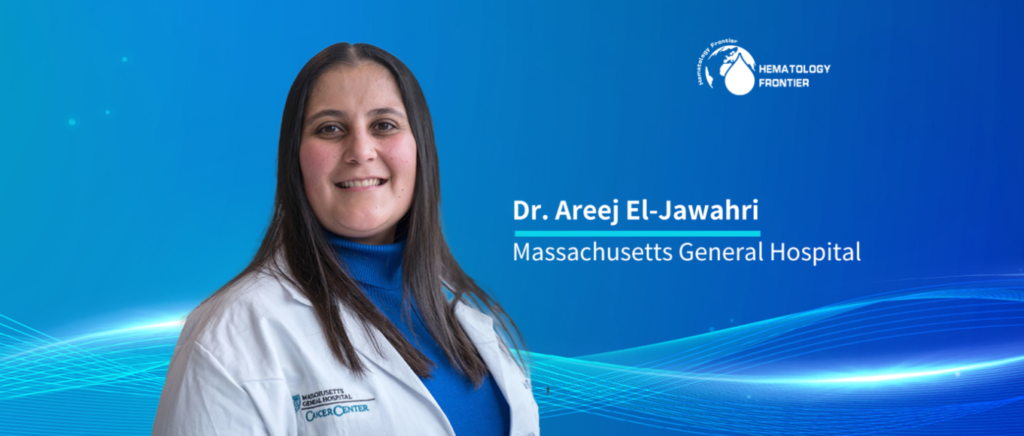
At the 2024 American Society of Clinical Oncology (ASCO) Annual Meeting, a multicenter randomized clinical trial was presented, focusing on a collaborative palliative care and oncology model for patients with acute myeloid leukemia (AML) and high-risk myelodysplastic syndrome (MDS) receiving non-intensive treatment (Abstract LBA6508). Dr. Areej El-Jawahri from Massachusetts General Hospital shared her professional insights on this study and end-of-life (EOL) care strategies in an exclusive interview with Hematology Frontier. Here, we present the key points to convey cutting-edge international perspectives.
Study Overview
Patients with AML and high-risk MDS receiving non-intensive chemotherapy face significant impairments in quality of life (QOL) and often lack timely discussions with clinicians about their EOL care preferences. Currently, there are no interventions specifically designed to optimize EOL and QOL for this population.
The study involved a multicenter randomized clinical trial at two hospitals, comparing a collaborative palliative care approach with usual care in 115 adult patients with AML and high-risk MDS undergoing non-intensive chemotherapy. Patients with newly diagnosed or relapsed/refractory disease were eligible within 30 days of treatment initiation. Patients in the collaborative palliative care group communicated with palliative care physicians monthly in outpatient settings and at least twice weekly during hospitalizations. Patients in the usual care group received palliative care only when needed.
The primary endpoint was the time from documentation of EOL care preferences to death, collected using natural language processing methods with validated algorithms querying electronic health records (EHR). Secondary endpoints included the rate of documented EOL care preferences from EHR, hospitalization rates, and hospice use at EOL. Patient-reported secondary endpoints included discussions about EOL care preferences with clinicians, QOL (Functional Assessment of Cancer Therapy-Leukemia, FACT-Leu), and psychological well-being (Hospital Anxiety and Depression Scale) three months post-enrollment.
The study enrolled 51.8% (115/222) of eligible patients. Patients in the collaborative palliative care group had a higher rate of documented EOL care discussions in EHR compared to usual care patients (96.5% vs. 68.4%, P<0.001). Overall, 61.7% (71/115) of patients died. Those receiving collaborative palliative care had a longer time from EOL care preference documentation to death (41 days vs. 1.5 days, P<0.001). Collaborative palliative care patients were more likely to report discussions about EOL care preferences with clinicians (56.9% vs. 14.0%, P<0.001) and were less likely to be hospitalized in the last 30 days of life (70.6% vs. 91.9%, P=0.031). Hospice utilization at EOL did not differ between groups. Three months post-enrollment, patients receiving collaborative palliative care reported better QOL (138.6 vs. 125.5, P=0.010), but there were no differences in depression or anxiety symptoms compared to usual care patients.
Therefore, the study demonstrates that palliative care significantly enhances discussions and documentation of EOL care preferences, reduces EOL hospitalization rates, and improves QOL for patients with AML and high-risk MDS (NCT03310918).
Oncology Frontier-Hematology Frontier:At this conference, you reported on the application of a collaborative palliative and oncology care model in patients with acute myeloid leukemia (AML) and high-risk myelodysplastic syndrome (MDS). Could you briefly introduce the background of conducting this study?
Dr. Areej El-Jawahri:We know that patients with acute leukemia and high-risk myelodysplastic syndrome face significant physical and psychological challenges throughout their illness. They often require intensive end-of-life care, which may not always align with their preferences. Our study aimed to optimize end-of-life care and quality of life for these patients by integrating specialty palliative care clinicians into their treatment.
Oncology Frontier-Hematology Frontier:How did the collaborative palliative care and oncology care model specifically improve the quality of life (QOL) for patients in this study? How did it optimize end-of-life care compared to usual care?
Dr. Areej El-Jawahri:This was a multi-site randomized clinical trial. Patients were randomly assigned to receive either the integrated palliative care model, where they were seen by both their oncology clinicians and palliative care clinicians, or usual care, where palliative care was available only upon consultation. Patients in the palliative care model received this support both during hospitalization and in outpatient settings.Patients who received palliative care showed significant improvements in their quality of life over the six months of the study. They were more likely to discuss and document their end-of-life care wishes, which led to fewer hospitalizations in the last 30 days of life compared to those receiving usual care. These findings underscore the importance of making palliative care a standard part of treatment for patients with AML and MDS.
Oncology Frontier-Hematology Frontier:What implications do you think the study results have for clinical practice?
The study demonstrates that early integration of palliative care can significantly benefit patients beyond just improving their quality of life. It helps optimize end-of-life care by ensuring that patient wishes are respected and documented. This model should be incorporated earlier in the treatment course for patients with AML and MDS. Additionally, it’s crucial to understand the active components of these palliative care interventions and train oncology clinicians to incorporate these components into their practice, given the limited number of specialty palliative care clinicians.
Previous studies have shown that early palliative care for patients with solid tumors improves both quality of life and end-of-life outcomes. Our study is the first to demonstrate similar benefits for patients with hematologic malignancies, specifically AML and MDS. This suggests that early palliative care intervention should be a standard practice across different types of cancers.
Summary
Dr. Areej El-Jawahri’s research highlights the crucial role of early palliative care interventions in improving the quality of life and end-of-life care for patients with AML and MDS. By integrating palliative care physicians into the comprehensive oncology treatment model, the study ensures that patients’ preferences are fully respected, achieving better treatment outcomes and more personalized care. These significant findings provide strong support for the widespread implementation of palliative care in the treatment of hematologic malignancies.
Reference: Areej El-Jawahri, et al. 2024 ASCO, abstract LBA6508.


